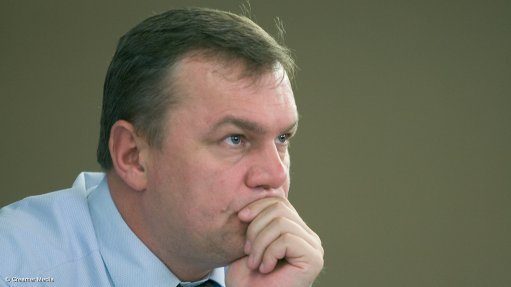
Kobus Verster
Photo by: Duane Daws
“The bottom line is that we have to stop scoring own goals and execute profitable work,” said Aveng CFO and acting CEO Kobus Verster on Tuesday.
Speaking in Johannesburg, he noted that continued losses at Aveng’s South African construction business, Grinaker-LTA, were largely to blame for the negative performance of the construction and engineering group in the financial year ended June 30.
Revenue for the financial year ended June 30 increased 27% from the previous financial year, to reach R51.7-billion. Headline earnings were down 6% to R466-million, with headline earnings a share down 3%, to 124.6c a share.
The year had been “very disappointing”, said Aveng chairperson Angus Band, with solid performances from the Australian construction business, as well as the mining business, but “very poor results from the South African construction business”.
The Queensland Curtis liquid natural gas pipeline project, in Australia, was also experiencing significant problems.
Grinaker-LTA in the 2012 financial year recorded a R790-million loss, which included a R200-million provision for the Competition Commission investigation into collusion in the South African construction industry, noted Verster.
In 2013, the loss at the business widened to R950-million.
Four months into his new job, MD at Grinaker-LTA, Brian Wilmot, former Aveng Moolmans boss, said the Aveng construction business was dealing with a toxic mixture of margin pressure, large contract losses, high overheads and the R270-million impact of continued labour unrest, especially at the Medupi power station construction site.
He added that the indirect impact of continued strikes at construction sites was probably “considerably higher”, as a result of turmoil and low productivity before and after strikes.
Losses on major contracts amounted to R500-million. One of these contracts was the Mokolo Crocodile pipeline project, which suffered losses owing to insufficient project skills, pipe supply problems and labour unrest, noted Wilmot.
In order to turn Grinaker-LTA around, the company would have to focus on the execution of projects, while it would also strengthen management and delivery capability, he added.
Wilmot said Grinaker-LTA was focused on filling “certain gaps left by high staff turnover”.
The business would also pursue profitable growth in Africa, especially in Mozambique, noted Verster.
Not all the solutions were in Aveng’s hands, however. Wilmot emphasised that there still existed overcapacity in the local construction industry, which placed margins under pressure. There was also a lack of sizeable construction projects in South Africa.
Grinaker-LTA’s turnaround would probably take another year or two.
Verster said he believed the company’s performance would improve this financial year, but added that Grinaker-LTA was “unlikely to be profitable”.
South Africa’s labour situation was also not set for a quick solution.
Aveng group human resources director Juba Mashaba said the Medupi power station project, in Limpopo, could serve as a case study in South African labour relations.
He said the area had “a lot of peculiarities”, with many people gaining their first ever job experience in a formal work environment on the construction site.
Many of these people, largely not unionised, lacked the knowledge of what the work environment demanded.
Mashaba said Aveng had teamed up with Eskom and other contractors to strengthen labour engagement on the construction site. He added that it was also desirable for workers to sign up with a union, as this would provide Aveng with a visible partner it could engage with around labour relations.
Aveng reported a two-year order book of R37.4-billion, as at June 30, down from the R39.7-billion in December 2012, and R46.9-billion in June 2012.
Verster said the focus was on delivering the “projects in the order book at acceptable margins”.
Band added that the company was not suffering from a lack of work, but rather quality of execution. He believed there was sufficient work to replenish the order book.
Around 73% of the order book was outside Rand-based countries.
COMPETITION COMMISSION UPDATE
South Africa’s Competition Commission in June imposed a collective R1.46-billion in penalties on 15 companies in the industry for collusive tendering related to projects concluded between 2006 and 2011.
Aveng received a penalty of R306.6-million, which the group did not contest.
Band said Aveng had no outstanding matters with the Competition Commission, and that it had put in place processes to ensure ethical behaviour by all Aveng employees.
“We hope this draws a line under this very regrettable part of our history.”